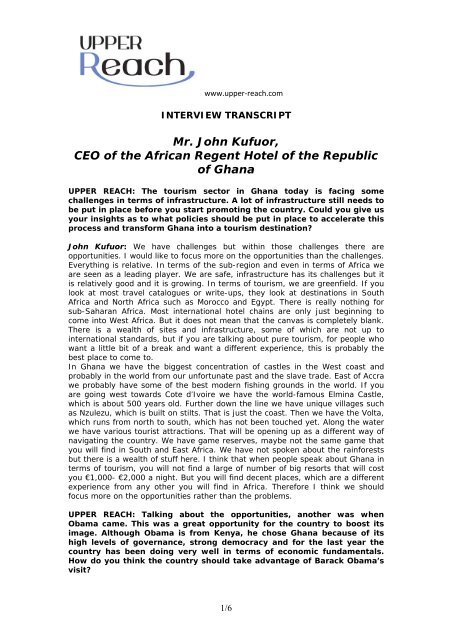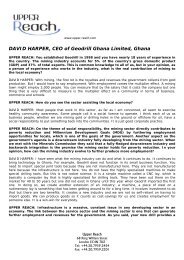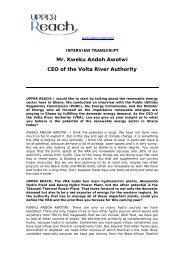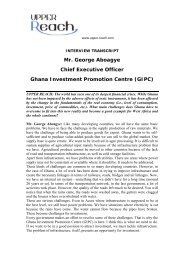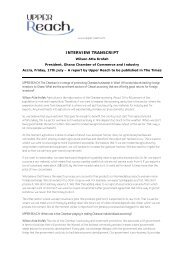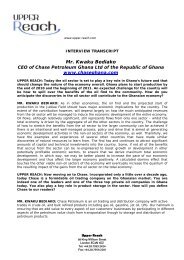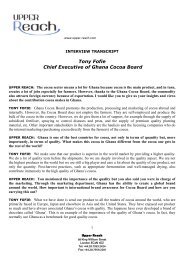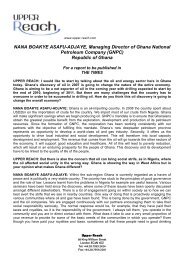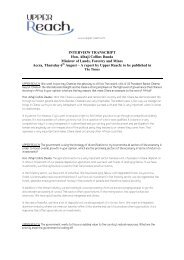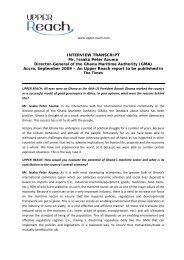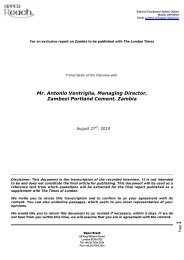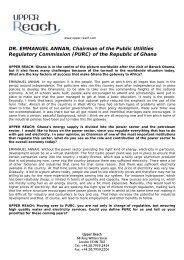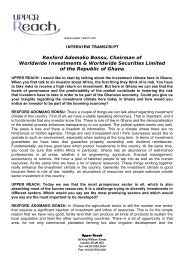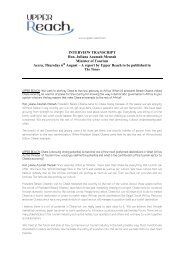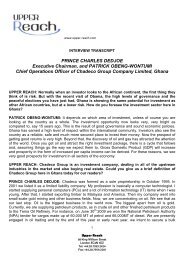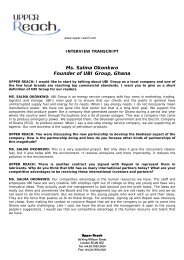John Kufuor, CEO of The African Regent Hotel of the ... - Upper Reach
John Kufuor, CEO of The African Regent Hotel of the ... - Upper Reach
John Kufuor, CEO of The African Regent Hotel of the ... - Upper Reach
You also want an ePaper? Increase the reach of your titles
YUMPU automatically turns print PDFs into web optimized ePapers that Google loves.
www.upper‐reach.com<br />
INTERVIEW TRANSCRIPT<br />
Mr. <strong>John</strong> <strong>Kufuor</strong>,<br />
<strong>CEO</strong> <strong>of</strong> <strong>the</strong> <strong>African</strong> <strong>Regent</strong> <strong>Hotel</strong> <strong>of</strong> <strong>the</strong> Republic<br />
<strong>of</strong> Ghana<br />
UPPER REACH: <strong>The</strong> tourism sector in Ghana today is facing some<br />
challenges in terms <strong>of</strong> infrastructure. A lot <strong>of</strong> infrastructure still needs to<br />
be put in place before you start promoting <strong>the</strong> country. Could you give us<br />
your insights as to what policies should be put in place to accelerate this<br />
process and transform Ghana into a tourism destination?<br />
<strong>John</strong> <strong>Kufuor</strong>: We have challenges but within those challenges <strong>the</strong>re are<br />
opportunities. I would like to focus more on <strong>the</strong> opportunities than <strong>the</strong> challenges.<br />
Everything is relative. In terms <strong>of</strong> <strong>the</strong> sub-region and even in terms <strong>of</strong> Africa we<br />
are seen as a leading player. We are safe, infrastructure has its challenges but it<br />
is relatively good and it is growing. In terms <strong>of</strong> tourism, we are greenfield. If you<br />
look at most travel catalogues or write-ups, <strong>the</strong>y look at destinations in South<br />
Africa and North Africa such as Morocco and Egypt. <strong>The</strong>re is really nothing for<br />
sub-Saharan Africa. Most international hotel chains are only just beginning to<br />
come into West Africa. But it does not mean that <strong>the</strong> canvas is completely blank.<br />
<strong>The</strong>re is a wealth <strong>of</strong> sites and infrastructure, some <strong>of</strong> which are not up to<br />
international standards, but if you are talking about pure tourism, for people who<br />
want a little bit <strong>of</strong> a break and want a different experience, this is probably <strong>the</strong><br />
best place to come to.<br />
In Ghana we have <strong>the</strong> biggest concentration <strong>of</strong> castles in <strong>the</strong> West coast and<br />
probably in <strong>the</strong> world from our unfortunate past and <strong>the</strong> slave trade. East <strong>of</strong> Accra<br />
we probably have some <strong>of</strong> <strong>the</strong> best modern fishing grounds in <strong>the</strong> world. If you<br />
are going west towards Cote d’Ivoire we have <strong>the</strong> world-famous Elmina Castle,<br />
which is about 500 years old. Fur<strong>the</strong>r down <strong>the</strong> line we have unique villages such<br />
as Nzulezu, which is built on stilts. That is just <strong>the</strong> coast. <strong>The</strong>n we have <strong>the</strong> Volta,<br />
which runs from north to south, which has not been touched yet. Along <strong>the</strong> water<br />
we have various tourist attractions. That will be opening up as a different way <strong>of</strong><br />
navigating <strong>the</strong> country. We have game reserves, maybe not <strong>the</strong> same game that<br />
you will find in South and East Africa. We have not spoken about <strong>the</strong> rainforests<br />
but <strong>the</strong>re is a wealth <strong>of</strong> stuff here. I think that when people speak about Ghana in<br />
terms <strong>of</strong> tourism, you will not find a large <strong>of</strong> number <strong>of</strong> big resorts that will cost<br />
you €1,000- €2,000 a night. But you will find decent places, which are a different<br />
experience from any o<strong>the</strong>r you will find in Africa. <strong>The</strong>refore I think we should<br />
focus more on <strong>the</strong> opportunities ra<strong>the</strong>r than <strong>the</strong> problems.<br />
UPPER REACH: Talking about <strong>the</strong> opportunities, ano<strong>the</strong>r was when<br />
Obama came. This was a great opportunity for <strong>the</strong> country to boost its<br />
image. Although Obama is from Kenya, he chose Ghana because <strong>of</strong> its<br />
high levels <strong>of</strong> governance, strong democracy and for <strong>the</strong> last year <strong>the</strong><br />
country has been doing very well in terms <strong>of</strong> economic fundamentals.<br />
How do you think <strong>the</strong> country should take advantage <strong>of</strong> Barack Obama’s<br />
visit?<br />
1/6
www.upper‐reach.com<br />
<strong>John</strong> <strong>Kufuor</strong>: I think we are already beginning to reap <strong>the</strong> benefits <strong>of</strong> that<br />
message. Obama came for a day but that day was on all <strong>of</strong> <strong>the</strong> major<br />
international networks. More importantly, he visited one <strong>of</strong> <strong>the</strong> tourism centres<br />
which I already mentioned. He went to Cape Coast Slave Castle which is about<br />
300 years old. I think that alone gave us exposure. It is one <strong>of</strong> <strong>the</strong> things that we<br />
do have to sell. Prior to his coming we did have a tourism industry and a Tourism<br />
Board with plans to promote Ghana. We partake in major international tourism<br />
fairs like <strong>the</strong> recent World Travel Market (WTM) in London. We want to be part <strong>of</strong><br />
this. We see ourselves as being one <strong>of</strong> <strong>the</strong> primary local players. We do not have<br />
many local players but this is primarily due to <strong>the</strong> way we conduct business. Not<br />
many Ghanaian companies or most <strong>of</strong> <strong>the</strong> hotels or tourism chains that you find<br />
here are ei<strong>the</strong>r backed by big foreign companies or institutions like <strong>the</strong> Social<br />
Security and National Insurance Trust (SSNIT). If you look at our bracket and<br />
competitive group <strong>of</strong> hotels, one or two do not have international market players<br />
<strong>of</strong> brands behind us. We are forging a different route and we want to be part <strong>of</strong><br />
what is coming. Like I said I do not want to talk about problems, I want to talk<br />
about potential and <strong>the</strong> potential is great.<br />
Coming back to <strong>the</strong> question, Obama has put us on <strong>the</strong> map. Prior to Obama’s<br />
visit, our focus was on <strong>the</strong> blacks in <strong>the</strong> diaspora, mainly from North America but<br />
also South America, including Brazil and Suriname. <strong>The</strong> concentration <strong>of</strong> camps<br />
tends to draw blacks, who believe <strong>the</strong>y originate from West Africa, back to <strong>the</strong>ir<br />
roots. I think that Obama’s visit and his visit to <strong>the</strong> castle have highlighted that<br />
again. Going forward it is one <strong>of</strong> <strong>the</strong> things we should look to sell in addition to<br />
<strong>the</strong> o<strong>the</strong>r factors that make us who we are: <strong>the</strong> fact that we have good<br />
government institutions, business works well, we are safe and we are <strong>the</strong><br />
gateway to <strong>the</strong> sub-region. West Africa has about 300 million people and we see<br />
ourselves as <strong>the</strong> centre for anybody coming to West Africa and to a large extent,<br />
sub-Saharan Africa. Coming first to Accra provides a number <strong>of</strong> advantages. We<br />
are only six hours from Europe. We have all <strong>of</strong> <strong>the</strong> major international airlines<br />
connections. We are lucky to be at <strong>the</strong> centre <strong>of</strong> <strong>the</strong> world. That in itself gives us<br />
tremendous advantages. Once people begin to divert <strong>the</strong>ir minds from <strong>the</strong> normal<br />
tourist destinations, we will be <strong>the</strong> natural centre.<br />
UPPER REACH: Moving towards <strong>the</strong> <strong>African</strong> <strong>Regent</strong> itself, you have been<br />
around for three years and have become one <strong>of</strong> <strong>the</strong> local players. People<br />
know about <strong>the</strong> Holiday Inn but <strong>the</strong>y do not know about <strong>the</strong> <strong>African</strong><br />
<strong>Regent</strong>, which boasts international standards but with local taste. Could<br />
you give us a brief definition <strong>of</strong> <strong>the</strong> <strong>African</strong> <strong>Regent</strong> <strong>Hotel</strong>?<br />
<strong>John</strong> <strong>Kufuor</strong>: We are trying to create a brand. Our tagline is ‘Simply Afropolitan’.<br />
Afropolitan is a combination <strong>of</strong> <strong>African</strong>, because we have <strong>the</strong> Afro influence, and<br />
cosmopolitan. We set out to create a brand which signifies everything good <strong>the</strong>re<br />
is about Africa. We appreciate that are clientele are international. We might<br />
receive someone from China, North America or Europe, and if <strong>the</strong>y want a<br />
cappuccino when <strong>the</strong>y wake up in <strong>the</strong> morning, <strong>the</strong>y should be able to have a<br />
cappuccino. <strong>The</strong>re are certain international standards. <strong>The</strong>se days standards are<br />
not local. We have created a hotel that can compete with <strong>the</strong> best international<br />
standards. We do not compromise with our standards. But at <strong>the</strong> same time,<br />
someone coming from China for a few days does not want to feel as if <strong>the</strong>y are in<br />
New York or Amsterdam. He wants to feel that he is in Africa. We have put a<br />
strong <strong>African</strong> influence into our hotel. It is so deep that sometimes <strong>the</strong> trained<br />
2/6
www.upper‐reach.com<br />
eye cannot even see it. Yes you can see <strong>African</strong> art, earthy tones and colours but<br />
everything has a meaning. That is for us to try and sell. That is what being<br />
“Afropolitan” is; it gives you a strong hint <strong>of</strong> who you are. But on <strong>the</strong> same token,<br />
you know that you are in an international hotel, both international and local can<br />
be seen. At <strong>the</strong> moment, we know that <strong>the</strong>re is nothing else like this on <strong>the</strong> local<br />
market. We are a business hotel, given where we are situated in a good<br />
neighbourhood in Accra, at an intersection <strong>of</strong> some <strong>of</strong> <strong>the</strong> main roads. We cater to<br />
business clientele and people who work with multinationals. <strong>The</strong>y form <strong>the</strong> bulk <strong>of</strong><br />
our business and because we have standards we have been able to survive in <strong>the</strong><br />
market so far. If we maintain standards and build on this logo, we can create a<br />
good local brand, which is ultimately what we want to do.<br />
Now if you look at <strong>the</strong> logo, it looks like a flower with four petals and a box. But it<br />
is an Adinkra symbol. All <strong>of</strong> <strong>the</strong> art we use has a meaning. This signifies<br />
something in our culture. <strong>The</strong> Adinkra symbols are used by Ghanaians and <strong>the</strong>y<br />
all have meanings. This symbol, on its own, literally translates as a sack <strong>of</strong> cola<br />
nuts. In many parts <strong>of</strong> West Africa when you receive a visitor one <strong>of</strong> <strong>the</strong> ways you<br />
greet <strong>the</strong>m is with cola nuts. A sack <strong>of</strong> cola nuts also means abundance,<br />
hospitality and so on. If you go into <strong>the</strong> bedrooms, we have this symbol carved<br />
into <strong>the</strong> headboards. In our language <strong>the</strong> Adinkra symbol means <strong>the</strong> crocodile<br />
lives in water but brea<strong>the</strong>s air. <strong>The</strong>re is ano<strong>the</strong>r showing <strong>the</strong> horns <strong>of</strong> a ram that<br />
signifies strength and humility. We have woven all <strong>of</strong> <strong>the</strong>se symbols into <strong>the</strong><br />
fabrics <strong>of</strong> our blankets. All <strong>of</strong> <strong>the</strong>se things signify who we are. We have tried to do<br />
something different from <strong>the</strong> o<strong>the</strong>rs. Talking about <strong>the</strong> opportunities in this<br />
country, going forward we hope that our brand will carry us forward in <strong>the</strong><br />
tourism sector. Tourism is potentially going to be one <strong>of</strong> <strong>the</strong> main revenue<br />
generators for this country. At <strong>the</strong> moment we are told that tourism is <strong>the</strong> third<br />
largest source <strong>of</strong> foreign exchange after gold and cocoa. But <strong>the</strong> tourism sector<br />
has barely started. That tells you how much potential <strong>the</strong>re is.<br />
UPPER REACH: Of course it also affects o<strong>the</strong>r sectors including<br />
communications and infrastructure.<br />
<strong>John</strong> <strong>Kufuor</strong>: All <strong>of</strong> <strong>the</strong>se sectors are improving. Over <strong>the</strong> last 10 years or so,<br />
<strong>the</strong> kilometres <strong>of</strong> tarred road have been doubled. Flights are still expensive but<br />
<strong>the</strong>y are much improved. We should accentuate <strong>the</strong> fact that we have come a<br />
long way but that <strong>the</strong>re is potential to go fur<strong>the</strong>r. We are on that path and we are<br />
in a take-<strong>of</strong>f mood. <strong>The</strong> problem being a local business person is that whereas we<br />
definitely invite people with technical expertise and financial wherewithal to join<br />
in with <strong>the</strong> locals, <strong>the</strong> locals must also look to participate. That is what we are<br />
about.<br />
UPPER REACH: <strong>The</strong>re is no global <strong>African</strong> brand. Having spoken about<br />
your logo and its importance, I hope you can tell us about two things.<br />
First, maybe it is still <strong>the</strong> early stages <strong>of</strong> you business, but how do you<br />
see <strong>the</strong> <strong>African</strong> <strong>Regent</strong> <strong>Hotel</strong> becoming a global <strong>African</strong> brand? And<br />
secondly, how do you see <strong>the</strong> <strong>African</strong> <strong>Regent</strong> expanding into Western<br />
Africa? Are you open to opportunities to share your expertise and open a<br />
second hotel? Can you foresee that or am I talking too soon?<br />
<strong>John</strong> <strong>Kufuor</strong>: No you are not talking too soon. We are trying to create a brand<br />
and we have already thought about <strong>the</strong>se things with regards to <strong>the</strong> strategy <strong>of</strong><br />
3/6
www.upper‐reach.com<br />
<strong>the</strong> hotel. Before coming we looked up <strong>the</strong> environment and what was available.<br />
Being a small player, we looked at what could be unique to <strong>the</strong> market and we<br />
came up with <strong>The</strong> <strong>African</strong> <strong>Regent</strong>. We say <strong>African</strong> because as much as Ghana is a<br />
part <strong>of</strong> <strong>the</strong> hotel <strong>the</strong>re are also influences and artwork from Benin, Mali and so<br />
forth. We are looking to sell all <strong>of</strong> <strong>the</strong> good things that are <strong>African</strong>. We are looking<br />
to promote Africa. I have seen <strong>the</strong> West. Here <strong>the</strong>re is a hunger but you do not<br />
see <strong>the</strong> development. Why do <strong>the</strong> multinationals keep coming back and doing<br />
business with us? Because we are <strong>African</strong> and we deliver international standards.<br />
<strong>The</strong>re is an infusion <strong>of</strong> Africa here.<br />
Where do we think we are going with this? We have talked about opportunities in<br />
this market and <strong>the</strong> fact that <strong>the</strong> entire tourism industry here contributes 1.2<br />
billion <strong>of</strong> tourism receipts. If we were to aim high, maybe in 10 years time we<br />
would be doing 10 billion. It is possible. It will require capital and technical<br />
expertise. But those are nice problems to have if <strong>the</strong> potential is <strong>the</strong>re. As a small<br />
player in this market, we have a template in Accra. It is a business hotel and<br />
maybe <strong>the</strong> first thing would be to replicate <strong>the</strong> template locally in two or three<br />
cities in Ghana. <strong>The</strong>n we could diversify from purely <strong>of</strong>fering a business<br />
proposition to a tourist proposition, and <strong>the</strong>n franchise. It is <strong>the</strong> normal order <strong>of</strong><br />
things. I do not know how it is going to work out but that is <strong>the</strong> strategy plan we<br />
are thinking <strong>of</strong>. That is about as much as I can say at <strong>the</strong> moment but we<br />
certainly have aspirations.<br />
UPPER REACH: When you are business orientated you follow steps but<br />
you have to see <strong>the</strong> thing as a whole. Before you get a house, first you<br />
paint it and <strong>the</strong>n you buy <strong>the</strong> furniture. I was thinking that perhaps you<br />
would like to start something else in West Africa because you have <strong>the</strong><br />
expertise here instead <strong>of</strong> just staying in Ghana. This is <strong>the</strong> business<br />
model.<br />
<strong>John</strong> <strong>Kufuor</strong>: Anything is possible. We are quite open to thinking outside <strong>the</strong><br />
box. But <strong>the</strong>re is also conventional wisdom. Maybe <strong>the</strong> nature <strong>of</strong> who we are,<br />
being independent and small, means that we will not necessarily follow that<br />
route. We are very open to using o<strong>the</strong>r methods.<br />
UPPER REACH: <strong>The</strong> first step to attract tourism is through conferences.<br />
In your opinion how should this niche in <strong>the</strong> market be explored? How<br />
important do you believe this aspect <strong>of</strong> tourism is?<br />
<strong>John</strong> <strong>Kufuor</strong>: It is a very important aspect <strong>of</strong> tourism and it helps <strong>the</strong> business.<br />
Two years ago <strong>the</strong>re was <strong>the</strong> United Nations Conference <strong>of</strong> Trade and<br />
Development (UNCTAD), which was one <strong>of</strong> <strong>the</strong> biggest we have ever had. We<br />
were wondering if we could do it because we never had that number <strong>of</strong><br />
international visitors and we do not really have <strong>the</strong> conference space. But all <strong>of</strong><br />
that is changing. That conference was hosted successfully in <strong>the</strong> same year as <strong>the</strong><br />
<strong>African</strong> Union summit with all <strong>of</strong> <strong>the</strong> <strong>African</strong> heads <strong>of</strong> state in 2008. <strong>The</strong> potential<br />
is <strong>the</strong>re. We have done it a few times with <strong>the</strong> limited resources we have, we can<br />
still successfully stage big events in Accra and perhaps to a lesser extent in<br />
Kumasi, Tamale and Takoradi, which are our four major cities.<br />
UPPER REACH: You also hosted <strong>the</strong> World Tourism Day.<br />
4/6
www.upper‐reach.com<br />
<strong>John</strong> <strong>Kufuor</strong>: Yes. So <strong>the</strong>re is an attachment with all <strong>of</strong> <strong>the</strong> pr<strong>of</strong>ile, even with<br />
Obama coming in, <strong>the</strong>re were good elections, that pr<strong>of</strong>ile is enabling us to attract<br />
<strong>the</strong> right events. With those prospects, we are also attracting international<br />
brands. If you are looking at <strong>the</strong> hotels <strong>the</strong>re are at least three major hotel<br />
developments across <strong>the</strong> country. We have <strong>the</strong> 5-star Kempinski and a Marriot<br />
which is right around <strong>the</strong> corner. It shows that major brands are now beginning<br />
to see that this is <strong>the</strong> place to be. We are in <strong>the</strong> right place from Europe, America<br />
and even from Asia. All <strong>of</strong> <strong>the</strong>se point to <strong>the</strong> future. Big brands do not come to a<br />
destination unless <strong>the</strong>y can assure <strong>the</strong>mselves that <strong>the</strong>y will be able to make<br />
money and maintain <strong>the</strong> brand. Whereas in <strong>the</strong> past over <strong>the</strong> last few years this<br />
sector <strong>of</strong> <strong>the</strong> market has contributed less than 10% <strong>of</strong> tourists, maybe it will be<br />
much more significant than that. In West Africa I do not think <strong>the</strong>re is anybody<br />
else apart from us. In Africa maybe you have South Africa and Egypt who do<br />
about three to five times <strong>the</strong> number <strong>of</strong> big conferences that we do. But if you<br />
give it five years I think it will be <strong>the</strong>re. We will at least be on par with <strong>the</strong>m<br />
given <strong>the</strong> infrastructure improvements and <strong>the</strong> growth <strong>of</strong> <strong>the</strong> local industry. It is<br />
critical for us and this particular facility. It forms a good part <strong>of</strong> our business and<br />
contributes significantly. One to <strong>the</strong> local multinationals coming in and to <strong>the</strong> local<br />
non-governmental organisations. Occasionally we do get international<br />
conferences as well so it is very important for us.<br />
UPPER REACH: We always like to give a personal touch and hear a bit<br />
about <strong>the</strong> background <strong>of</strong> our interviewees. You are <strong>the</strong> son <strong>of</strong> <strong>the</strong> former<br />
President but I would like you to tell us about your background, how it is<br />
related to tourism, and how your background helps to shape your<br />
priorities as <strong>the</strong> <strong>CEO</strong> <strong>of</strong> <strong>the</strong> <strong>African</strong> <strong>Regent</strong> <strong>Hotel</strong>?<br />
<strong>John</strong> <strong>Kufuor</strong>: I lived abroad for quite awhile. I did a degree in Business<br />
Administration and Accountancy in what is now Greenwich University but used to<br />
be Thames Polytechnic at <strong>the</strong> Woolwich campus. After that I went to train as a<br />
management accountant. I got my degree in 1987, finished my accounting exams<br />
in 1989. I worked in <strong>the</strong> industry and my first job was with what was <strong>the</strong>n called<br />
Border Industries headquartered in Knightsbridge. It is now Redson, a big<br />
multinational quoted on <strong>the</strong> London Stock Exchange. <strong>The</strong>n I went into<br />
telecommunications and worked for British Telecom for a year. I was part <strong>of</strong> a<br />
group <strong>of</strong> financial analysts who were hired to start up One-2-One, which is now T-<br />
Mobile UK, for about seven years. <strong>The</strong>n I got my M.B.A. in 1997. I started<br />
working for PricewaterhouseCoopers consulting in 1998 and worked for <strong>the</strong>m for<br />
three years in London. <strong>The</strong>n I returned to Accra to work for<br />
PricewaterhouseCoopers for Central Africa, before breaking <strong>of</strong>f at <strong>the</strong> end <strong>of</strong> 2004<br />
to work on this project.<br />
I have had good business training, first as an accountant and <strong>the</strong>n as a<br />
consultant. In consulting <strong>the</strong>se days <strong>the</strong> key is not just technical know-how but<br />
<strong>the</strong> management <strong>of</strong> knowledge and how to build an effective team once you have<br />
got a properly defined objective. If you bring <strong>the</strong> right players on board, <strong>the</strong>re are<br />
many different facets <strong>of</strong> any such project. On one hand you may be looking to<br />
fund <strong>the</strong> project so you have to speak to financiers. At <strong>the</strong> same time for myself,<br />
being a promoter, you have to speak with technical people such as hospitality<br />
experts. You are building so you also need engineering expertise. <strong>The</strong> critical<br />
thing in business <strong>the</strong>se days is not <strong>the</strong> fact that you are an accountant, but to be<br />
able to look at <strong>the</strong> big picture, define an objective properly and marshal that<br />
5/6
www.upper‐reach.com<br />
knowledge to create <strong>the</strong> outcome. I find that <strong>the</strong> business training I have had, <strong>the</strong><br />
experience in consulting in particular and in industry, people critically look at<br />
every aspect. It is all in <strong>the</strong> monthly and quarterly reports. That prepared and<br />
immensely helped me to visualise what I wanted, build it and <strong>the</strong>n to manage in<br />
going forward.<br />
UPPER REACH: This is your first time in <strong>the</strong> tourism sector?<br />
<strong>John</strong> <strong>Kufuor</strong>: Yes. This building was here for a while but it was uncompleted. We<br />
acquired <strong>the</strong> site in September 2004 and we opened for business on March 2007.<br />
UPPER REACH: To finalise <strong>the</strong> interview, we always like to give <strong>the</strong><br />
interviewee an opportunity to send a final message to <strong>the</strong> readers <strong>of</strong> <strong>The</strong><br />
London Times.<br />
<strong>John</strong> <strong>Kufuor</strong>: <strong>The</strong> message I would like to convey is that, from a tourism and<br />
business perspective, Ghana is open for business. <strong>The</strong>re is great potential for<br />
both businessmen and tourists alike. <strong>The</strong>y should look to chart that unbeaten<br />
course and go where people have not been because that is where <strong>the</strong> real<br />
potential is in Ghana. If you are coming to Africa, make a stop in Accra and see<br />
what we have to <strong>of</strong>fer. You will be pleasantly surprised at <strong>the</strong> potential we have in<br />
Ghana. We are looking forward to a very positive future.<br />
UPPER REACH: Thank you very much.<br />
6/6


